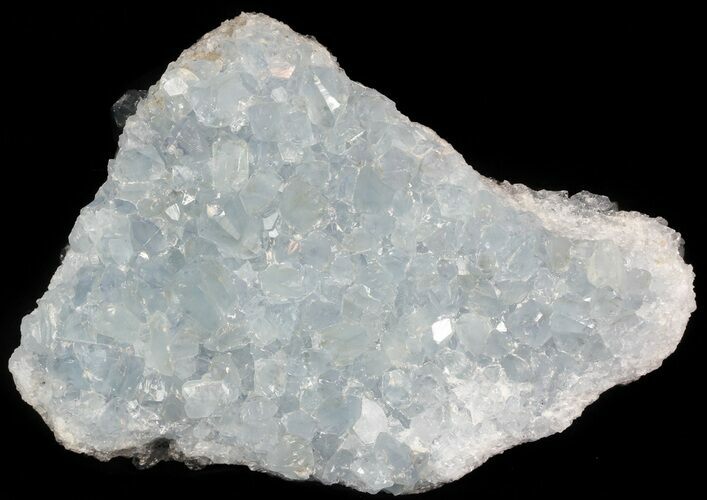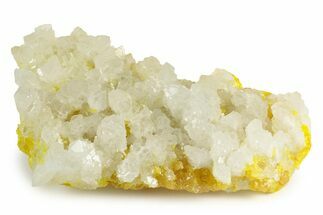This Specimen has been sold.
6" Double-Faced Celestine (Celestite) Crystal Cluster - Madagascar
This is a beautiful, 6.0" long double-faced cluster of sky blue celestine crystals from Madagascar. Both sides of this specimen contain hundreds of crystal terminations, most of which present wonderful clarity.
This specimen comes with an acrylic display stand.
This specimen comes with an acrylic display stand.
About Celestite
Celestite (or celestine) is a mineral consisting of strontium sulfate (SrSO4). It tends to form attractive, well-shaped crystals that are often found inside of geodes. One of the main sources of celestine is the deposits on the northwestern coast of Madagascar.
This famous Madagascar locality discovered in 1967 annually produces about 15 tons of the material. It is located near the village of Sakoany, on the western side of the banks of the Betsiboka River along Madagascar's northwestern coast. The celestine-bearing layer is found in a maximum 30-meter thick lens between layers of crinoidal limestones and sandy greywacke from the end of the Cretaceous. It is mined by digging shafts up to 15 meters (50 feet) deep to reach the deposits. The celestine occurs mainly as 2 different types: as geodes up to a maximum size of 60 cm in diameter, and as crystal clusters up to 15 cm in diameter.
The world's largest known geode is 35 feet (10.7 m) in diameter at its widest point with celestine crystals reaching 3 feet wide, and is located near the village of Put-in-Bay, Ohio. The geode has been converted into a viewing cave, Crystal Cave.
Celestite (or celestine) is a mineral consisting of strontium sulfate (SrSO4). It tends to form attractive, well-shaped crystals that are often found inside of geodes. One of the main sources of celestine is the deposits on the northwestern coast of Madagascar.
This famous Madagascar locality discovered in 1967 annually produces about 15 tons of the material. It is located near the village of Sakoany, on the western side of the banks of the Betsiboka River along Madagascar's northwestern coast. The celestine-bearing layer is found in a maximum 30-meter thick lens between layers of crinoidal limestones and sandy greywacke from the end of the Cretaceous. It is mined by digging shafts up to 15 meters (50 feet) deep to reach the deposits. The celestine occurs mainly as 2 different types: as geodes up to a maximum size of 60 cm in diameter, and as crystal clusters up to 15 cm in diameter.
The world's largest known geode is 35 feet (10.7 m) in diameter at its widest point with celestine crystals reaching 3 feet wide, and is located near the village of Put-in-Bay, Ohio. The geode has been converted into a viewing cave, Crystal Cave.
SPECIES
Celestine (Celestite)
LOCATION
Sakoany, Boeny, Madagascar
SIZE
6.0" long, 4.2" wide, 2.0 lbs
CATEGORY
ITEM
#45651
 Reviews
Reviews















